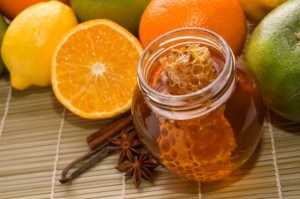 The presence of sweeteners is ubiquitous in modern day food and drink. Manufacturers of food and beverage aren’t dumb, they know we humans have an insatiable appetite for sweets. In order to satisfy our sweet tooth without ruining our health and gaining weight (your body stores sugar as fat), we must choose natural sweeteners and avoid the artificial and otherwise unhealthy.
The presence of sweeteners is ubiquitous in modern day food and drink. Manufacturers of food and beverage aren’t dumb, they know we humans have an insatiable appetite for sweets. In order to satisfy our sweet tooth without ruining our health and gaining weight (your body stores sugar as fat), we must choose natural sweeteners and avoid the artificial and otherwise unhealthy.
I’ve identified the best and worst sweeteners with a brief description of each. This article is in relation to sweetening your smoothies, but can be applied to anything you eat. Once you know which sweeteners are suitable to consume, and which to eschew, you’ll be able to easily identify healthy verse unhealthy food.
Good Sweeteners
By only using good and natural sweeteners your health will benefit and you won’t feel guilty when indulging on sweets. There are several different “sugar substitutes” for you to choose from, experiment with each to determine which one your taste buds prefer.
Stevia
An herb from the leaves of the South American stevia plant, it has zero calories, zero sugar, and no effect on blood sugar. Stevia is considered a no glycemic sweetener because it registers a zero on the glycemic index. Stevia comes in several forms, each of which is anywhere from 25 to 300 times sweeter than sugar, therefore you need very little to sweeten your smoothie.
White stevia granules or crystals are the most popular form, but it’s also available as a liquid, and green powder, which is the pure broken down herb. Remember, a little goes a long way; so start out small and work your way up.
Honey
For centuries people have utilized honey as a sweetener. Honey is rich in natural enzymes and antioxidants and contains a wide range of minerals such as iron, calcium, zinc, potassium, magnesium, copper, chromium, and phosphorus.
Honey does contain a fair amount of fructose (fruit sugar) and should be consumed in moderation. Word of caution: if you suffer from conditions relating to excess sugar consumption such as candida you should avoid honey and go with a low to no glycemic sweetener.
Stick with local and/or organic honey. I get mine from my local farmers’ market. Most honey in the plastic bear tubes you get from the grocery store actually contain very little real honey and are laced with undesirable additives.
Maple Syrup
Like honey, 100% pure maple syrup contains an array of healthy vitamins and minerals. Maple syrup helps boost your antioxidant defenses, is good for your heart, and improves your immune system. It’s also beneficial for the male reproductive system.
Maple syrup does contain natural sugars and shouldn’t be used too liberally. Find a local source of maple syrup, or better yet tap your own trees!
Fruit
My favorite way to sweeten my smoothies is through a variety of delicious fruit. The natural sugars present in fruit are packaged with fiber and other substances that slow down sugar absorption and prevent a “sugar spike”. Ideally, fruit is all you need to sweeten your smoothies.
Other Good Sweeteners
Here are a few other good sweeteners to consider. I don’t have personal experience with them, but have read and heard good things. Organic blackstrap molasses, coconut palm sugar, sucanat, and Lo Han extract. If you have experience with one of these sweeteners I’d love to hear about it in the comments below.
Update 12/7/12: I use to recommend xylitol, but have since changed my stance due to articles like this: Xylitol: Not as Sweet As It’s Cracked Up to Be
Bad Sweeteners
The bad sweeteners are those you want to avoid like the devil. Sugar wreaks havoc throughout the body and artificial sweeteners might be even worse, and studies are showing they don’t actually help you lose weight, but rather just the opposite.
White Sugar
White table sugar extracted from sugarcane and beets has no place in healthy diet. It’s been referred to as the cocaine of the food industry. In moderation, white sugar isn’t so bad, but with its presence in so many foods today, the average person ends up consuming far more than they did just 100 years ago.
When I see a smoothie recipe that calls for a tablespoon or two of white sugar I cringe. Besides refraining from adding pure sugar into your smoothies, you also want to avoid sweeteners rich in sugar such as chocolate syrups, caramel, and ice cream.
Agave
About 15 years ago agave nectar burst onto the health scene and was heralded as a natural and healthy sugar alternative. Unfortunately, this is far from the case. Dr. Mercola was one of the first to sound the alarms about agave as a highly processed sugar detrimental to health. Click here to read why it’s actually worse than high fructose corn syrup.
High Fructose Corn Syrup (HFCS, Corn Syrup)
This sinister sweetener has crept into food products far and wide. I believe by now most people know to avoid this, but often don’t realize just how omnipresent it is. Be sure to check your labels to avoid high fructose corn syrup and be aware of any new names its being referred to as.
Artificial Sweeteners
There are plethora of artificial sweeteners on the market today. The more popular ones include Sucralose, Aspartame, Saccharin, Splenda, and NutraSweet. These may contain zero calories, which you would think would help you lose weight, but that’s not the case. These artificial sweeteners are foreign to the human body, cause signals to get crossed, lead to weight gain in the long run, damage organs, and are known excitotoxins, which are detrimental to the brain.
Sweet Conclusion
A good rule of thumb for all food and drink also applies to sweeteners, stick to what is naturally occurring in nature. Moderation is also good to keep in mind as mentioned above with honey and maple syrup. By cutting the bad sweeteners our of your diet, reducing sugar consumption overall, and sticking to the natural, good sweeteners, your health will surely improve.
I’d love to hear your thoughts on sweeteners. Please leave a comment below. Cheers!
Sources for this blog post include:
http://www.naturalnews.com/034102_honey_consumer_alert.html
http://www.naturalnews.com/034317_natural_sweeteners_raw_honey.html
http://articles.mercola.com/sites/articles/archive/2010/03/30/beware-of-the-agave-nectar-health-food.aspx
http://www.westonaprice.org/health-topics/agave-nectar-of-the-gods/

Comments are closed.